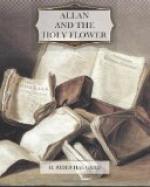“I say, you know, Quatermain,” he said, “we can’t let the old boy go alone, or at least I can’t. It’s another matter for you who have a son dependent on you. But putting aside the fact that I mean to get——” he was about to add, “the orchid,” when I nudged him. Of course, it was ridiculous, but an uneasy fear took me lest this Komba should in some mysterious way understand what he was saying. “What’s up? Oh! I see, but the beggar can’t understand English. Well, putting aside everything else, it isn’t the game, and there you are, you know. If Mr. Brother John goes, I’ll go too, and indeed if he doesn’t go, I’ll go alone.”
“You unutterable young ass,” I muttered in a stage aside.
“What is it the young white lord says he wishes in our country?” asked the cold Komba, who with diabolical acuteness had read some of Stephen’s meaning in his face.
“He says that he is a harmless traveller who would like to study the scenery and to find out if you have any gold there,” I answered.
“Indeed. Well, he shall study the scenery and we have gold,” and he touched the bracelets on his arm, “of which he shall be given as much as he can carry away. But perchance, white lords, you would wish to talk this matter over alone. Have we your leave to withdraw a while, O King?”
Five minutes later we were seated in the king’s “great house” with Bausi himself and Babemba. Here there was a mighty argument. Bausi implored Brother John not to go, and so did I. Babemba said that to go would be madness, as he smelt witchcraft and murder in the air, he who knew the Pongo.
Brother John replied sweetly that he certainly intended to avail himself of this heaven-sent opportunity to visit one of the few remaining districts in this part of Africa through which he had not yet wandered. Stephen yawned and fanned himself with a pocket-handkerchief, for the hut was hot, and remarked that having come so far after a certain rare flower he did not mean to return empty-handed.
“I perceive, Dogeetah,” said Bausi at last, “that you have some reason for this journey which you are hiding from me. Still, I am minded to hold you here by force.”
“If you do, it will break our brotherhood,” answered Brother John. “Seek not to know what I would hide, Bausi, but wait till the future shall declare it.”
Bausi groaned and gave in. Babemba said that Dogeetah and Wazela were bewitched, and that I, Macumazana, alone retained my senses.
“Then that’s settled,” exclaimed Stephen. “John and I are to go as envoys to the Pongo, and you, Quatermain, will stop here to look after the hunters and the stores.”
“Young man,” I replied, “do you wish to insult me? After your father put you in my charge, too! If you two are going, I shall come also, if I have to do so mother-naked. But let me tell you once and for all in the most emphatic language I can command, that I consider you a brace of confounded lunatics, and that if the Pongo don’t eat you, it will be more than you deserve. To think that at my age I should be dragged among a lot of cannibal savages without even a pistol, to fight some unknown brute with my bare hands! Well, we can only die once—that is, so far as we know at present.”




